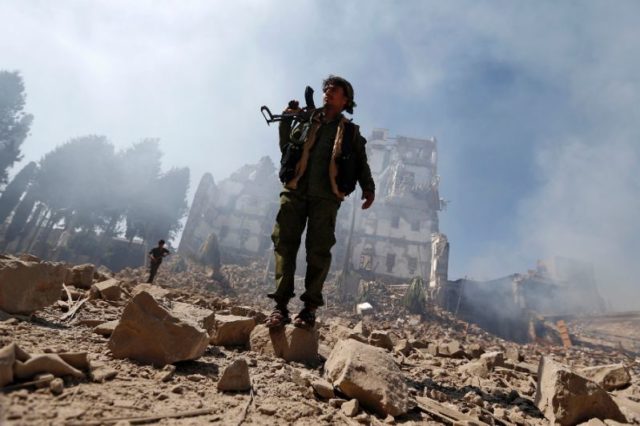Iran uses Houthi tribal militia “as a proxy” to block peace in war-torn Yemen, that country’s ambassador to the United States said in Washington, D.C. early in April.
Amb. Ahmed Awad bin Mubarak noted that “Houthis were represented in the drafting process” for a new constitution that went to Yemeni President Abdurabbah Mansour Hadi in 2015. The draft “was the result of 10 months of comprehensive internal dialogue,” bin Mubarak told students, parents and staff at Washington’s Field School. “For the first time in the history of Yemen, 50 percent of the delegates were women,” another 20 percent “youth from both the north and south” of the previously divided country.
But soon after Hadi received the draft, the Houthi militia resumed action against the internationally-backed government. “This is not a war between Saudi Arabia and Yemen,” or even “between Saudi Arabia and Iran,” bin Mubarak maintained.
Rather, “Iran is using the Houthis,” who—like Iran’s theocratic rulers are Shi’a Muslims—as a bargaining chip against both Saudi Arabia and the United States, the ambassador said.
The U.S. backed-Saudis lead a coalition of Sunni Muslim Persian Gulf countries in Yemen’s conflict. Bin Mubarak said that on April 3, the day before he appeared at the Field School, Houthi forces fired at a U.S. Navy vessel in the Persian Gulf. Saudi Arabia has charged that Houthi rebels repeatedly have launched Iranian-supplied missiles at Saudi targets.
“I never asked Shi’a or Sunni” before the current conflict erupted, bin Mubarak said. But now in Yemen, “unfortunately, people talk this way.”
Noting that many of Yemen’s 22 million people suffer illness and malnutrition, the ambassador said, “we are in a man-made disaster, not a natural disaster.” There is military “escalation everywhere.”
Nevertheless, he believes a diplomatic solution is possible. A professor of management before the 2011 “Arab Spring” ousted the previous government and led to Yemen’s present turmoil, bin Mubarak said “we hope through the U.N. peace process we will have talks very soon. … Despite all the Houthis did, they should be involved,” he added. “But as a political party, not a militia.
“If you want a real ceasefire … you have to have people on the ground, monitors.” The ambassador said the process could “start in one area—build trust” and open the territory for humanitarian aid, prisoner exchanges, coverage by journalists.
“Unfortunately, the first response from the Houthis” to the latest proposals “was to stage attacks.” This was due to “the influence of Iran and Hezbollah.”
The ambassador pointed out that the Houthi rebels’ slogan is “Death to America, Death to Israel, a Curse on the Jews and Victory for Islam!”
“They conduct brain-washing in areas they control … like the Taliban did in Afghanistan. The problem with any religious groups when they face a difficulty, they see it as a test for God. … So [we] need not just military pressure, but also political” on the Houthis and their Iranian supporters, the ambassador said.
But bin Mubarak added that he had hope. “Yemen is not a poor country. It was known historically [from Roman times] for its riches. … We have two roadmaps [to peace.] The dialogue and the U.N resolution” on Yemen’s conflict.” Among Yemenis themselves, “the solution should be easy,” so long as the Houthis and their supporters are blocked militarily.


